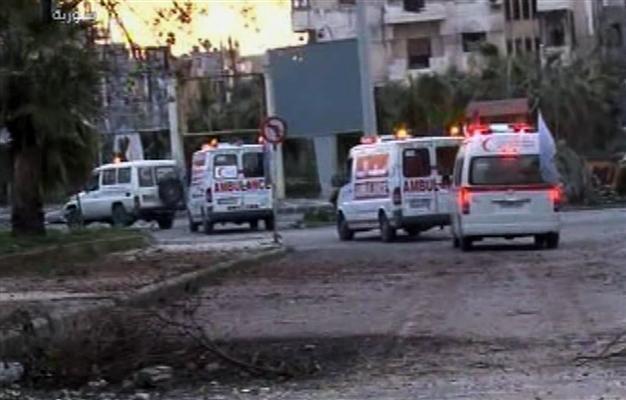Aid convoy heads to Syria's battered Homs
DAMASCUS - Agence France-Presse

An image grab taken off the official Syrian TV on February 25, 2012 shows Red Crescent ambulances in the besieged Syrian city of Homs on February 24. AFP Photo
A Red Cross relief convoy was headed to the battered Syrian city of Homs today after regime forces overran its Baba Amr neighbourhood ending a nearly four-week pounding.More than 20,000 civilians are believed to have been trapped in the district through the prolonged bombardment with a lone doctor reported to be tending to the scores of casualties in a single makeshift clinic.
As rebel fighters pulled out on Thursday in the face of the regime's overwhelmingly superior firepower, the opposition Syrian National Council (SNC) warned of "barbaric" reprisals against the neighbourhood's residents.
The UN rights body appealed to Syria to respect international law after receiving unconfirmed reports of 17 "grisly" executions as regime forces overran Baba Amr.
Rupert Colville, spokesman for the Office of the High Commissioner for Human Rights, said the OHCHR had received information "suggesting a particularly grisly set of summary executions" on Thursday.
The UN Security Council called on Syria to allow "immediate" humanitarian access to protest cities in a statement backed by Russia and China, which had vetoed two resolutions on the conflict last October and again in February.
"It is vitally important that there is humanitarian access into Homs and elsewhere so that people can get the help they need," British Prime Minister David Cameron said at a European Union summit in Brussels.
A first International Committee of the Red Cross and Syrian Arab Red Crescent relief convoy was on the road to Homs with seven truckloads of desperately needed supplies, an SARC spokesman said..
"We are on the way to Homs, along with the International Committee of the Red Cross, carrying food, medicines, blankets, milk for babies and other equipment," said SARC operations chief Khaled Erksoussi.
The rebels said they had pulled out "tactically" from Baba Amr on Thursday, the second day of an all-out ground assault by the feared Fourth Armoured Division led by President Bashar al-Assad's younger brother Maher.
The storming of the rebel bastion began early Wednesday, following 27 straight days of relentless shelling which has made the neighbourhood an icon of the more than 11-month uprising against Assad's regime.
Other parts of Homs, including the Khaldiyeh, Bayyada, Bab Sbaa and Hamidiyeh neighbourhoods, remain in the hands of the "terrorists" and still have to be "dealt with," a security source in Damascus told AFP.
Activists called for nationwide protests on Friday to demand the arming of the rebel Free Syrian Army (FSA) to give it the firepower to defend itself against regime forces.
"Assad, don't delude yourself, there are a thousand and one Baba Amrs," the activists said on their "Syrian Revolution 2011" Facebook page.
"Soon, we'll be back even stronger," it added, next to a picture of rebel fighters.
The SNC announced on Thursday that it was forming a military bureau to coordinate the flow of arms to the rebels after calls from Gulf Arab states for weapons deliveries ran into opposition from Washington which said it feared Al-Qaeda might exploit the situation.
Rebel fighters who were involved in the defence of Baba Amr said that claims the jihadist network was active in Syria were mere "slander" spread by the regime.
In a statement, the FSA's Al-Farouk Brigade said it "denies claims of any presence of Al-Qaeda in Syria and urges journalists who were evacuated to testify to that, in order to refute the regime slander." Two French journalists, trapped for days in the bombardment of Baba Amr, were being kept under observation by doctors in neighbouring Lebanon on Friday after being brought out to safety, a diplomatic source told AFP.
French foreign ministry spokesman Bernard Valero said the journalists Edith Bouvier and William Daniels were to expected to arrive in Paris by hospital plane in "the early evening," but stressed: "It will be up to doctors to give the green light for this repatriation." Bouvier, who suffered multiple fractures in the same February 22 rocket attack on a makeshift media centre, was in "stable" condition in a Beirut hospital, a diplomatic source said.
Syrian authorities, meanwhile, said they located the bodies of US journalist Marie Colvin and French photographer Remi Ochlik in Baba Amr after the rebels retreated. The journalists were killed in the same rocket attack.
The FSA's Al-Farouk Brigade said a number of its fighters were killed or wounded evacuating foreign journalists from Homs.
A draft statement that EU leaders were expected to approve in Brussels later on Friday holds the Damascus authorities responsible for the security of foreigners in Syria, including journalists.
The draft also urges members of the Security Council, particularly Damascus allies Beijing and Moscow, "to work together in an effort to stop the violence." Russian Prime Minister Vladimir Putin in talks with foreign news executives late Thursday rejected the idea that Moscow was taking sides in what he described as an "armed civilian conflict".
"Our aim is not to help one of the sides -- not the Syrian authorities nor the armed opposition -- but to obtain an all round reconciliation," he said in comments published on the government website Friday.
"We have no special relationship with Syria," he added.
















